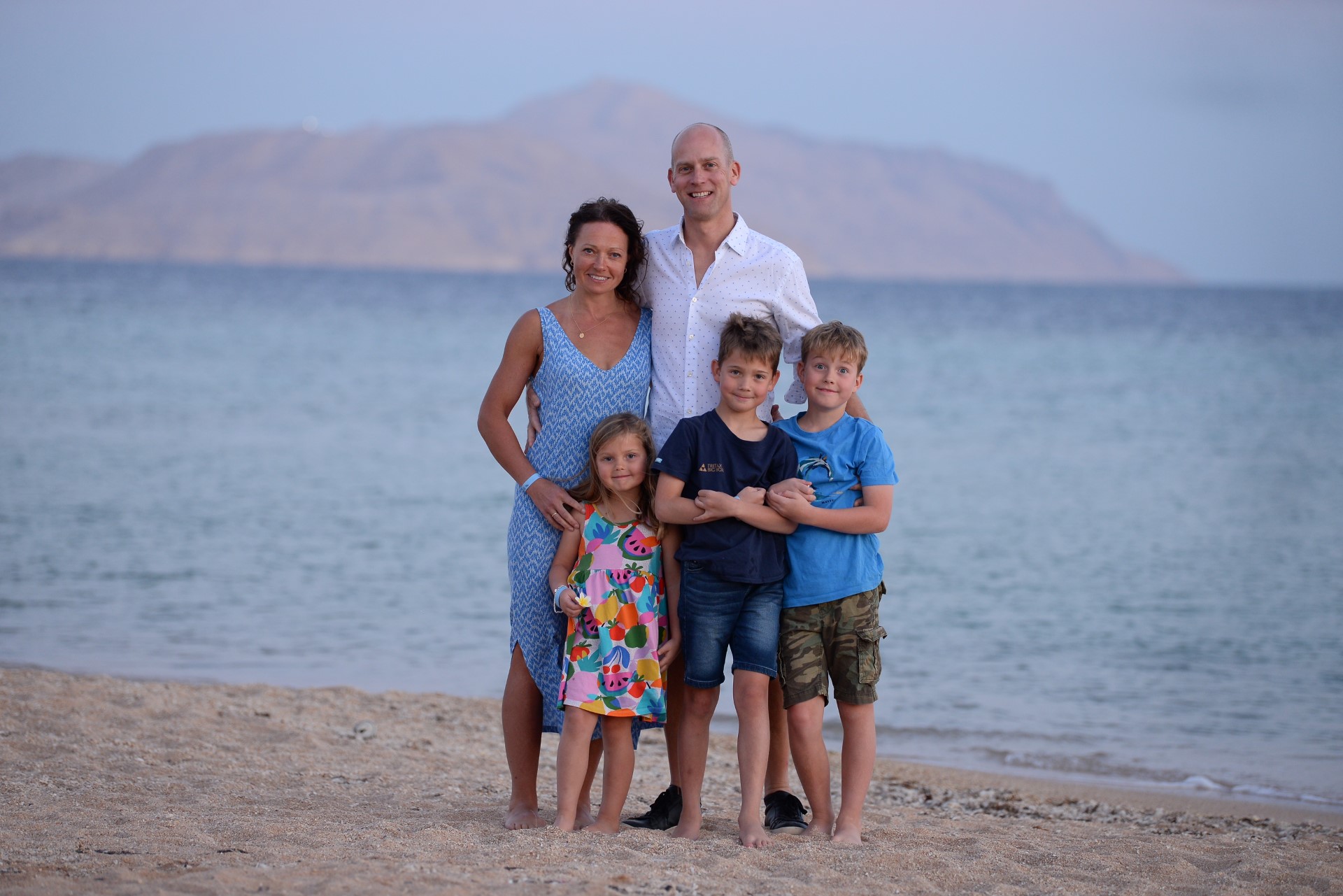Where it all began
“With the right mindset ordinary people can do extraordinary things”
In early 2020, Felicity was a busy mum of three, working four days a week in her role in Marketing. The Oxfordshire based mum, then aged 46, decided she wanted a new challenge, both physically and mentally, and chose to row across the Atlantic over Christmas and New Year of 2021/22. This was to prove to herself, and to society, that with the right mindset, ordinary people can do extraordinary things.
“I wanted to inspire women and children to think big and not be restricted by societal views on what women should or shouldn’t do. In particular, I wanted to shake up the views towards mums and how we don’t need to be defined or limited by our ‘mum’ title” explains Felicity.
“I rallied up support from my family and together with two friends and my sister – all fellow mums – we formed ‘The Mothership’, the crew that would take on the two month trip, traveling from the Canaries to Antigua.”
The charity expedition, called the Talisker Whisky Atlantic Challenge, known as the World’s Toughest Row, required meticulous planning and training before departure which Felicity did not take lightly. Not only did the crew need to complete rigorous training courses, from navigation and VHF radio to first aid at sea, but all food and water (and basic hygiene) supplies needed to be planned to ensure the women had enough supplies to stay safe throughout their trip.
Felicity continues: “I trained for six days a week for 18 months through a mixture of strength training, pilates and hours on the rowing machine. This is an important fact to highlight in my story, because I was incredibly physically fit – probably the fittest I had ever been in my life. I had muscles in places I had never had before , and although life was very busy juggling careers, families and training, I felt strong and ready for an epic adventure.”
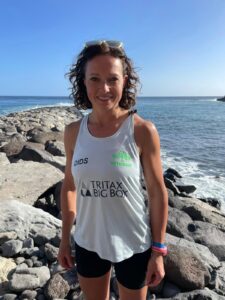
First symptoms
“I first noticed my bowel cancer symptoms when rowing the Atlantic”
“My symptoms first began a couple of weeks after we had set off from La Gomera and were embarking on the 3,000 mile row across the world’s second largest ocean.
“I noticed my bowel movements were all over the place on our row. However, we were eating dehydrated ration packs and rowing for 12-16 hours a day, so I assumed the changes in my bowel habits were down to the unusual eating patterns, excess exercise and unusual food I was eating.
“I won a joke award from my team for the ‘most likely to need an inconvenient poo’”
“My other crew members noticed my notable toilet trips and I even won a joke award from my team for the ‘most likely to need an inconvenient poo’. When I needed the toilet, I couldn’t wait until my rowing shift was over and I had to go straight away. But this was something the other ladies were not experiencing. I had a strong desire to go to the toilet more often and an urgent need to go and it was too uncomfortable to hold it in. My stools were definitely looser, but I was going to the toilet in a bucket in a small rowing boat and throwing it over the side into the ocean, so I didn’t give it much thought and didn’t have the time to think much more about it and carried on rowing.
“The row itself took 40 days, and although it was hard being away from my family for that long, I know I needed the mental and physical challenge to get a part of my old, pre-kids self back. It was a mental challenge as much as a physical one, but I loved it and the celebration when we reached land after nearly six weeks at sea was ecstatic. I felt on top of the world and slightly invincible and so proud when I saw my family and parents waiting for me just after the finish line on Nelson’s Dockyard in Antigua. The elation was also mixed with a sense of nostalgia and a feeling that I didn’t want the adventure to be over.
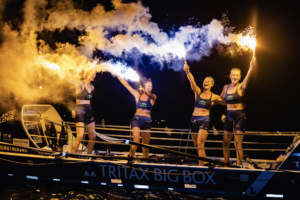
After the Atlantic Adventure
“Because of how physically fit I was, I didn’t feel alarmed by the blood in my poo”
“We returned home at the end of January 2022. My symptoms gradually built up, including needing to go to the loo more often and I slowly started to notice blood in my stools. I didn’t notice any particular weight loss or fatigue other than the usual feeling of being tired from motherhood and work deadlines. Because of how physically fit I was, I didn’t feel alarmed by the blood in my poo, but I knew it wasn’t normal and knew I had to get it checked out in case I had caught an infection after 40 days living on a boat eating very unusual food.
“I saw a GP in April 2022 and they carried out a blood and stool sample test. I was told the tests were to rule out cancer but that my symptoms were likely to be celiac disease, IBS or digestive issues. My blood tests for IBS came back clear, ruling that out quickly. My stool sample, however, did confirm there was blood in my poo and I was put on a two week pathway for a colonoscopy to rule out cancer and to investigate further.”
20th May 2022
“I will never forget 20th May 2022 as this was the day everything changed. I went for my colonoscopy (a small camera that looks inside the bowel) at the John Radcliffe Hospital in Oxford, but it fell on the same day as the Atlantic Challenge race awards in London which would be a long-awaited reunion with the other crews. I didn’t want a sedation at the colonoscopy just in case it affected my much needed, and anticipated, big night out to celebrate our Atlantic row.
“During the colonoscopy, a trainee started doing the procedure but then I became aware that the senior clinician had taken over. I had gas and air to ease the discomfort so I felt slightly out of it and unaware fully of what was going on. I then remember someone in the room asking “are you awake, can you hear me. Look at the screen, do you know why you are here and what that is?”
I replied “I know I am here to rule out cancer” after which the Endocopist (the clinician carrying out the endoscopy) bluntly replied “that lump on the screen is a tumour. You have bowel cancer.” It turned out I had a 5cm wide tumour which could have been there for many months, possibly even a year.
“I was in total shock and disbelief, and although I knew that cancer was a possibility, I had been told it was highly unlikely. It was a very quick and definitive diagnosis. I called my husband and was as blunt to him as the Endoscopist was to me, and quite simply said ‘I have cancer’.
“Tackle cancer like you tackled the Atlantic”
“I had a CT scan on the same day as my colonoscopy to check if the tumour had spread to other parts of my body. My husband arrived at the hospital just after I was back from the CT scan and was in as much shock as I was, whilst being incredibly strong and supportive for me.
“A senior consultant, who knew about my recent rowing trip, confirmed what had been seen in the colonoscopy and said something that I will never forget: ‘Tackle this like you tackled the Atlantic’. This stuck with me and was the best piece of advice I could have been given and is the mantra I use in life now.
“Whilst still at the hospital, one of the nurses looked at my painted toe nails and said they looked lovely. I told her I had them done for a night in London to celebrate the Atlantic Row but was so gutted I could no longer go. The nurse, who was amazing, replied ‘Why can’t you go? Nothing has changed health wise since this morning. You can’t change anything and there is nothing to be lost by going.’ This resonated with me so much and from that day I decided cancer was not going to control my life, so my husband and I got in my car and drove to London, straight from hearing the news I had bowel cancer. But I was determined to carry on living.
“In London, I saw my younger sister Pippa at the Atlantic reunion. Not knowing what was going on in my world, she asked how my morning was, expecting me to jokingly moan about work or the faff of getting the kids ready for school.
“We’re really close and I couldn’t lie to her, so I told her that I found out I had cancer. She burst out crying. I told her not to, that I didn’t want to cry anymore and we were to enjoy the night and carry on. And so we did. But like myself and my husband, I could tell she was shocked as I was so active and didn’t have months of deteriorating health to warn me and others about what might be coming.
“The next day, after the big reunion party, I headed home for my son’s seventh birthday where I hosted a trampolining party for him after not much sleep and with a million thoughts going around my head about my diagnosis. I didn’t tell anyone other than my husband and my sister, but those next few days were the worst time of my life because I didn’t know if it had spread or if it was isolated in just the bowel. Not knowing if I would see my kids grow up or how many more birthday parties I would be able to host was harrowing. But like any mum, you put on a brave face and pretend to your children that everything is absolutely fine.
“Five days later I got the CT results which confirmed the cancer looked contained, but there was something suspicious that needed further investigation on my liver. I needed an MRI scan to confirm whether it was a cyst on my liver or whether it was secondary cancer.
“Due to this unknown, my husband and I decided not to tell our children or anyone else until we knew if it was a treatable illness or a terminal illness. My Dad had terminal renal cancer and I didn’t want to worry him whilst he was going through his own battle before I knew the full picture. I spoke to my parents several times without telling them and felt I had this cloud hanging over me.”
The treatment
“I met my Consultant, Dr Kat Baker, a week after the colonoscopy with a colorectal nurse to help with the more emotional questions including how I would tell my children.
“It was agreed that I would have an operation to remove the cancer and this was just a few weeks after the colonoscopy. Therefore it was a relatively quick turnaround from symptoms, to diagnosis to treatment.
“Surgery was the first course of action because the cancer hadn’t visibly spread and Kat talked about the recovery period and reassured me how quickly I could go back to exercise and challenges. Kat had similar life interests and background and she understood how important it was for me to get back to living an active lifestyle, full of adventures.
“I decided to tell my parents and my brother about my cancer when I knew the results of the MRI scan. My Dad was devastated for me as he had cancer himself and didn’t think it fair that his daughter should go through the same plight. My brother went into practical mode and booked in a colonoscopy as this was recommended by clinicians due to the hereditary links. My sister did the same.
“I told the children mummy needed an operation in hospital and will be a bit sore afterwards but didn’t mention cancer to them, to keep any worries for them at bay. I had a hip replacement a few years before so it wasn’t an alien concept to them that mummy needed to go to hospital for an operation.
“Cancer can happen to anyone at any time”
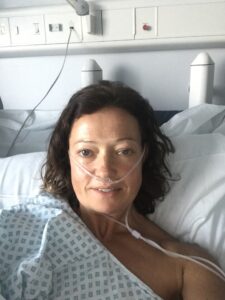
“I had the operation in the Churchill Hospital on 13 June and as soon as I woke up from the surgery, I had an instinct to take a selfie and upload it onto Facebook next to a picture of me from the Atlantic Row. I wanted to show the contrast between a rower in the middle of an adventure versus me in the hospital bed with gowns on and tubes in to show that cancer can happen to anyone at any time.
“I had a type of keyhole surgery called ‘robotic anterior resection’ to remove the tumour; local charity Occtopus was an early donor to the establishment of the robotic surgery programme in Oxford which meant I was able to have minimally invasive surgery to help aid my recovery.
“I stayed in hospital for three nights then felt ready to go home. I believe I had a quick recovery time possibly due to how fit I was and I was determined to get back on my feet.
“The mundane ordinary things suddenly become very special and I am grateful for the time I had at home with the family”
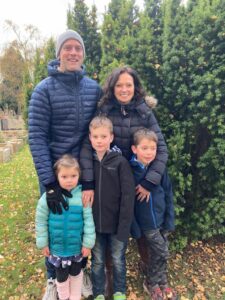
“My mum came to stay to help with the children, and to keep me feeling mentally well, I had to move and get out and about so I did a lot of walking. I spent a lot of time at home with the family and picked the kids up from school every day, which in hindsight was refreshingly normal and lovely. The mundane ordinary things suddenly become very special and I am grateful for the time I had at home with the family, particularly having been away for two months over Christmas. I am an optimist and chose to see the positive in everything.”
“During the operation, my Consultant Kat removed 40 lymph nodes around the site of the tumour to test for detectable cancer cells in the lymphatic system. Around two weeks later I was told the results found cancer in three lymph nodes which was a low proportion, but it meant I was in stage three, fairly advanced cancer and qualified for chemotherapy. Kat remained positive and said the chemo is a good way to reduce the likelihood of the cancer coming back by hitting it hard while I was young and fit. In a way, I felt glad I was going to have chemo to minimise the risk of it coming back.
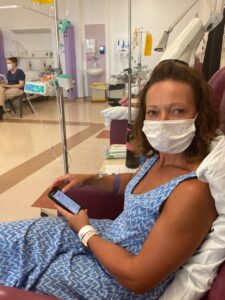
“I had chemo for three and a half months in three week cycles and was still able to exercise including running during treatment. I had a two hour infusion of one drug and 48 hour infusion of another drug and a permanent line was inserted in my arm to allow me to receive the chemo at home. I was connected to a pump and could walk around the house with the line attached to me. My middle child, Ben, hated seeing this as it was a clear sign I wasn’t well.
“One of the most difficult things was telling my children I had cancer ahead of my chemo. They knew my Dad, their Grandad (Poppa) had terminal cancer so we had to tell our children that I had cancer too but a different type of cancer. We tried to explain I had a type of cancer I could get better from but Poppa couldn’t and we needed to say goodbye to him, but not me. Dad sadly died on 09 August 2022, the day after my first round of chemo started.”
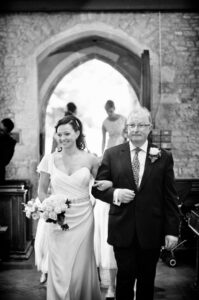
After treatment and the future
“After my operation I attended Speech Day at my former school, Monmouth School, with my sister to talk about the Atlantic Row. The speech was booked months before I knew about my cancer and being so close to my surgery, I wasn’t sure if I would be able to do it but I also felt I had to at least try.
“Without planning it, I decided I did want to open up about my cancer and show how anything is possible despite having the ‘big C’. It was the first time I spoke about it publicly and it was extraordinary seeing the audience reaction. That was when I realised it was important to share my story.
“I now feel like I can do anything and I deserve to do anything. Nothing should hold me back from doing what I want to do and I know I have the mental resilience to do anything. No matter what the world throws at me, I will be fine, and this gives me the confidence to try new things and not just to accept the ordinary.
“Lots of people have asked me to share my story so I have decided that I will now embark on a new adventure – sharing my experience through motivational speaking. I have over 20 years of experience in the corporate world so I can use this background to relate the lessons I have learned to a business audience.
“I am sharing my story to remind everyone, particularly young, busy, seemingly healthy mums, about the importance of noticing symptoms and acting on them quickly. I also want to thank my incredible Consultant Kat Baker, who is also a Trustee at the charity that helps to fund research and innovation at the Oxford Colorectal Surgery department where I was treated, which has an international reputation and is leading the way in the management of colorectal diseases.
“The power of a positive mindset will get you through anything life throws at you”
“The power of a positive mindset will get you through anything life throws at you. Whether you are tackling a 40 day row across the Atlantic or recovering from stage three cancer. Positivity gives you the ability to see challenges as opportunities and change positives into negatives. Cancer has opened doors for me and shown me that there are other opportunities out there. It has given me a huge inner confidence that I can do anything.
“Being hopelessly optimistic really pays off”
“Being hopelessly optimistic really pays off and I hope this helps anyone else going through their own cancer journey. I am currently feeling fit and well again and excited for the future and living my life to the fullest. The latest treatment techniques, which Occtopus helps fund, has resulted in a positive outcome and that is why the work of bowel cancer charities such as Occtopus is vital to support research and funding towards early detection and high quality, minimally invasive treatment for better patient outcomes.”
Felicity is now a motivational speaker and life coach. To speak to Felicity, please email liz.ashworth@occtopus.org.uk

To donate to Felicity’s JustGiving page, please visit here: https://www.justgiving.com/page/felicity-ashley-occtopus

